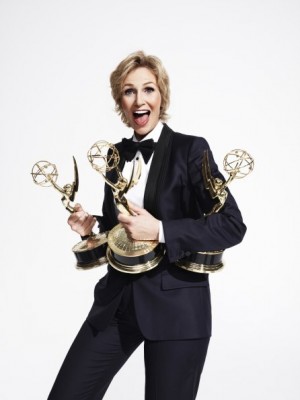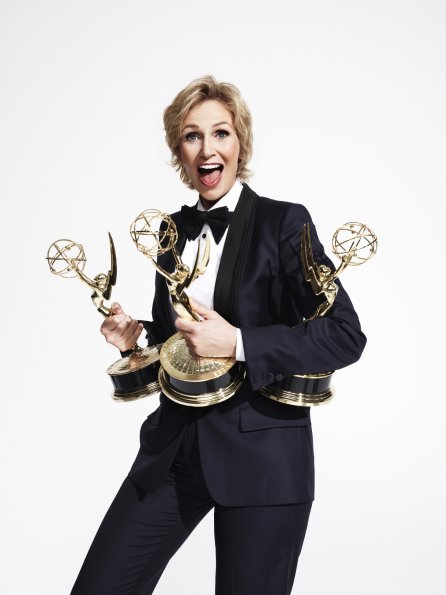Well, the 63rd annual Modern Family Appreciation Awards have come to a close, and all my hopes for mainstream recognition of brilliant but lesser-known TV comedy have sunk into a chasm of unassailable depths. I know I sound like a bitter fan whose favorite shows didn’t win any awards, and there are certainly worse shows than Modern Family on the air that are more worthy of attack. But it has to give even the most devoted Modern Family fan pause when all four of the ABC juggernaut’s male supporting actors are nominated in the same category and the show virtually sweeps the Emmys for comedy.
Do Emmy voters only watch highly rated shows? Do they only vote for the actors they recognize? As a TV nerd, it’s intensely frustrating to watch such a domination of my favorite shows (many of which weren’t even nominated in the first place). As I said before, Modern Family is not a show to revile. It’s a satisfyingly pleasant and well-constructed show, but it doesn’t take much risk with the format or engage with anything beyond the general family sitcom structure. It’s comfort food—a low-risk but very clearly high-reward structure. With things as they are in the TV world right now, the Best Comedy Emmy seems to be Modern Family’s to lose for the rest of its run.
Modern Family’s near-perfect Emmys night and my subsequent frustration symbolize a growing divide in the television world. TV, by its very design, is a mass medium. Television was and is intended to be entertainment for the group. Network TV programming has always been as general and inoffensive as possible. Networks aren’t aiming to reinvent the wheel; they are aiming to create something comfortable and innocuous enough to keep people coming back week after week. Much of the reason people love competition shows like American Idol and America’s Got Talent is because they are experiencing something within a community and are able to actively take part in what they are watching (“OMG, did you see Adam Lambert sing last night?! I voted for him 20 times on my T-Mobile 4G slider flip phone!”). Multi-camera sitcoms have live studio audiences or laugh tracks so that the viewers at home feel like they are watching something with a bunch of other people, being part of something.

But the way people view TV is changing. DVDs and streaming video services like Netflix are making TV a more insular experience. People stream their favorite TV shows straight to their computer and can watch the whole run of a series if they want to. This mode of consumption caters much more to the individual. Programming is more varied and specifically targeted. TV viewers are less concerned about watching something that doesn’t offend them and are more interested in watching shows that challenge them. Modern Family is not a bad show by any stretch of the imagination; however, what is so frustrating about it is that it just toes the line between the classic family-oriented sitcom and some of the more progressive series on the air today. So when executive producer Steve Levitan quips about a fan telling him his show is teaching our country to be tolerant, it’s hard for me to swallow. It’s an innocuous, mild family sitcom disguising itself as some kind of progressive movement. It’s a show with extremely smart executives behind it who know the business well enough to walk that line.
So I guess, in a way, the creative team behind Modern Family deserves their massive success. But when more ambitious comedies like Community and elite comedic ensemble shows like Parks and Recreation fall by the wayside, when shows like FX’s Louie are literally changing the way we think of a television show structurally on a weekly basis, when performances like Nick Offerman’s as Ron Swanson on Parks and Recreation are glazed over, it’s hard not to want to punch the TV screen. For a funnier and more succinct reaction to Offerman’s Emmy snub, just see what his costar Amy Poehler had to say about it.
Bitter griping aside, the 2011 Emmys did have bright spots, and they came in the drama categories. The repeatedly unappreciated but often transcendent drama Friday Night Lights was finally recognized. FNL got a win for best writing for the episode “Always,” a huge upset over Mad Men’s “The Suitcase.” Additionally, Kyle Chandler took home the Best Lead Actor in a Drama Emmy, another huge surprise. Deserving supporting actors Peter Dinklage (Game of Thrones) and Margo Martindale (Justified) each received acting awards for drama. Mad Men took home the big prize for TV drama in a clear case of “Breaking Bad didn’t air within the timeframe of eligibility for the Emmys”-itis.
Overall, this year’s Emmys committed the biggest crime an award show can commit—they were boring. Despite host Jane Lynch’s mugging, the show dragged, and the predictability of the winners didn’t help matters. Modern Family’s comedy domination and The Daily Show’s continued drubbing of all other variety shows took pretty much all the fun out of the awards. Like most years, the Emmys were mostly frustrating, with a few bright spots almost cruelly thrown at us as we watch risky and artistically challenging shows go unrecognized.
But don’t be mad at the Emmys; that’s just their nature. They’re always going to go with what pleases the most people. They’re always going to irrationally love any and all movie stars who grace the small screen (congrats to Melissa McCarthy for her Emmy win for Bridesmaids—I mean Mike and Molly!). So if you’re as pissed off at the Emmys as I am, there’s little solace to be found in feeling angry. You can always dive back into your Netflix account and choose your own Best Comedy.


2 Comments on “The Emmys: Modern Family Is Really Good, Mad Men Is Also Good–But Did We Mention Modern Family Is Really Good?”